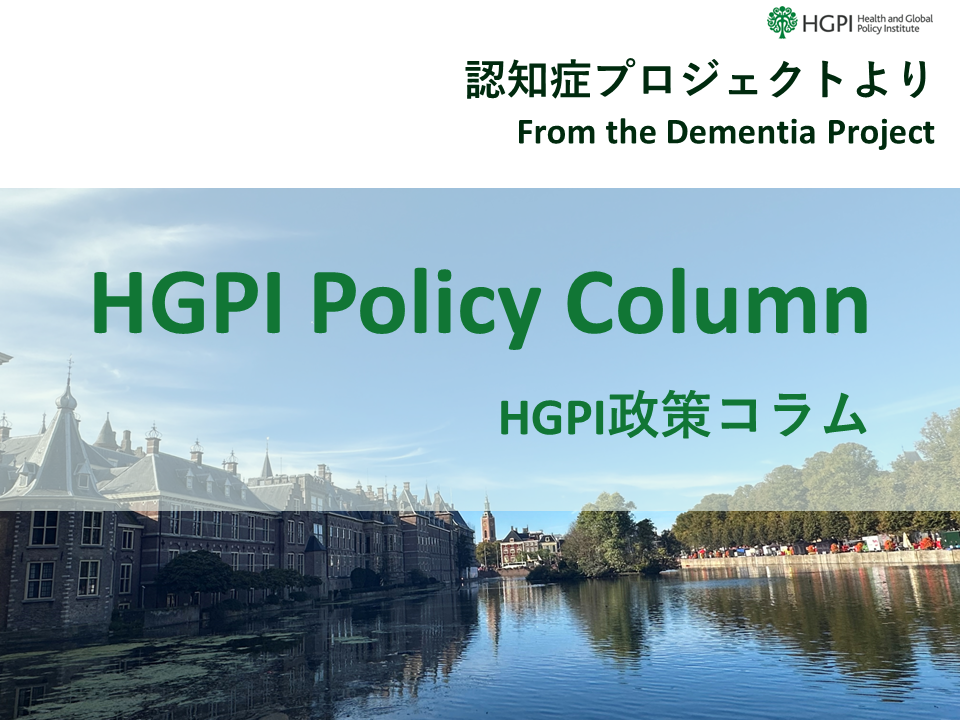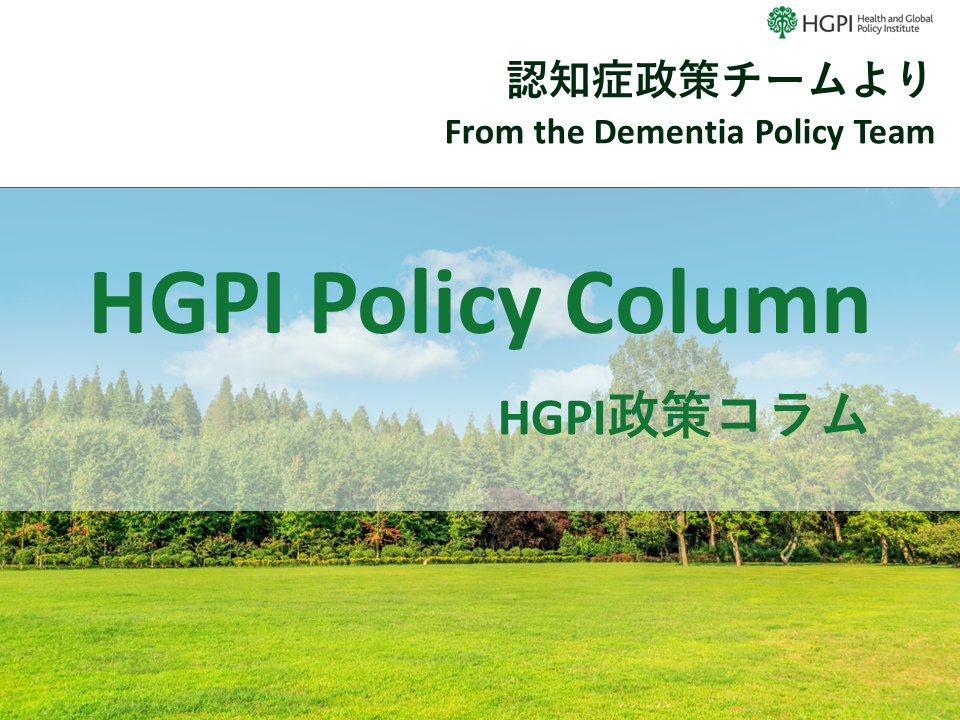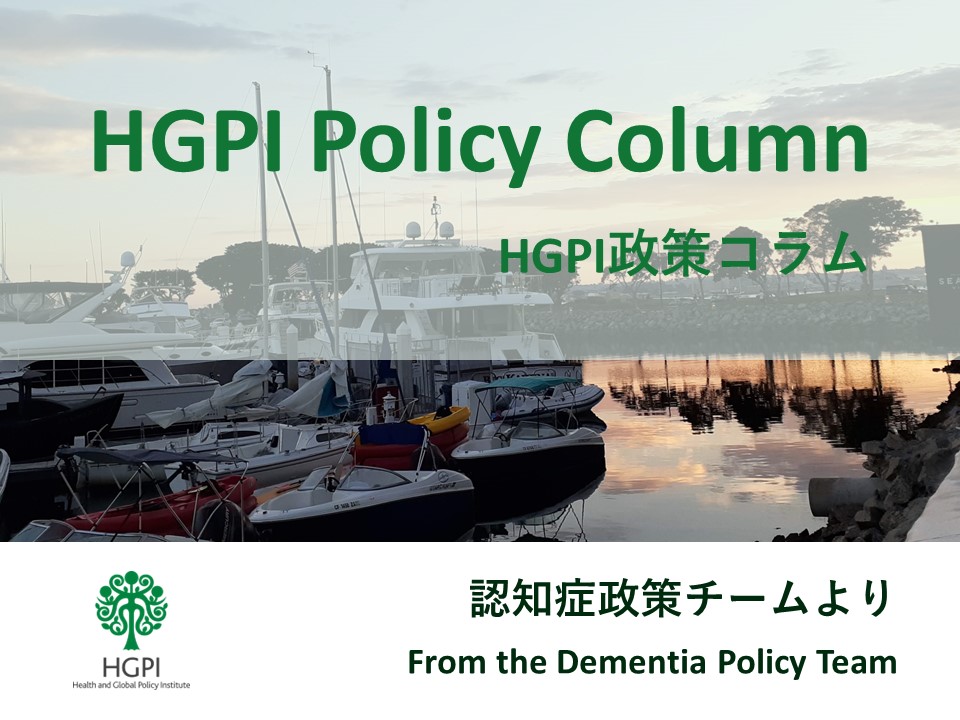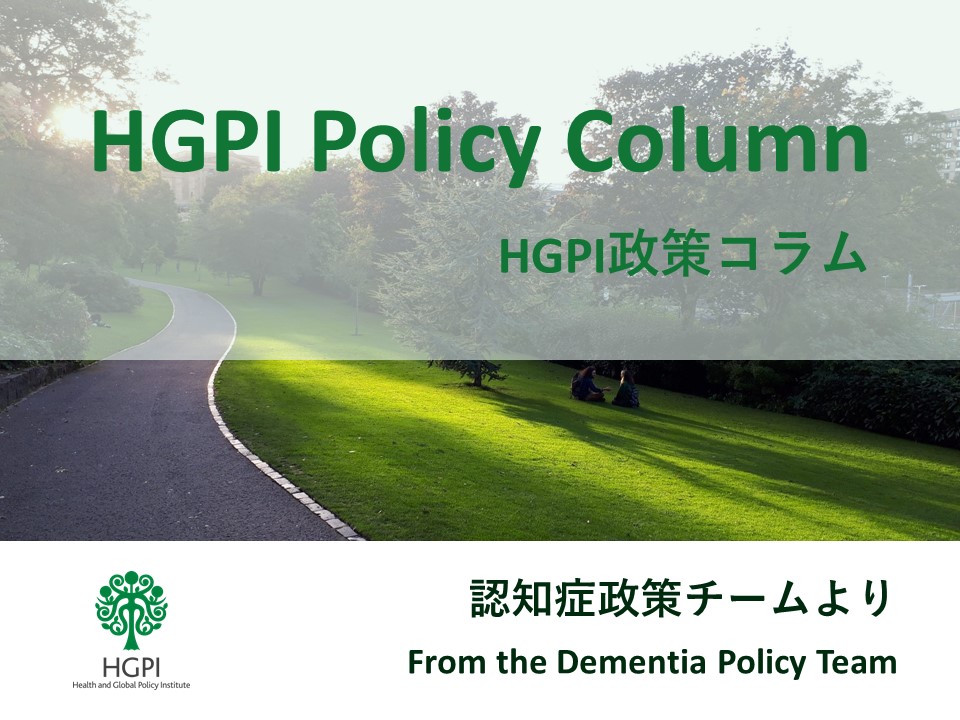[HGPI Policy Column] (No.46) From the Dementia Project “The Current State of Dementia Policy in the International Community in 2024”
date : 8/19/2024
Tags: Dementia, HGPI Policy Column
![[HGPI Policy Column] (No.46) From the Dementia Project “The Current State of Dementia Policy in the International Community in 2024”](https://hgpi.org/en/wp-content/uploads/sites/2/HGPI_HGPI-Policy-Column_20240815_eye-catch-image.jpg)
<POINTS>
- On May 29, 2024, Alzheimer’s Disease International (ADI) presented their annual report that charts progress on national policies for dementia. The title of this year’s report is, “From Plan to Impact VII – Dementia at a crossroads.”
- 48 countries and regions have formulated national dementia plans. Among them, 39 are WHO Member States. To meet the WHO target of having 75% of Member States complete national policies, strategies, plans, or frameworks for dementia by 2025, ADI has requested unanimous support from WHO Member States for a ten-year extension of the Global Action Plan on Dementia to 2035.
- Japan’s national policy for dementia was determined to be “Stage 5B: Plan adopted, funded, and monitored,” which is the same stage as last year.
From Plan to Impact VII
In this column, we will examine the May 29, 2024 report presented by Alzheimer’s Disease International (ADI) titled, “From Plan to Impact VII – Dementia at a crossroads” (hereinafter, “the 2024 ADI report”).
This annual report from ADI summarizes progress on national strategies for dementia in each country and region and examines real examples of such plans, making it a valuable resource for understanding developments in dementia policy around the world. The HGPI Policy Column has covered each of the previous ADI reports, from 2020 to 2023. This column is our fifth installment in this series.
The Current State of Dementia Policy in the International Community (July 2020)
The Current State of Dementia Policy in the International Community in 2021 (June 2021)
The Current State of Dementia Policy in the International Community in 2022 (September 2022)
The Current State of Dementia Policy in the International Community in 2023 (August 2023)
Requesting a ten-year extension to 2035 with sights set on a new target
The 2024 ADI Report found that as of May 2024, 48 countries and regions had already developed national dementia plans, 39 of which are WHO Member States. Of those 39 Member States, 20 are in Europe; 9 are in the Americas; 2 are in Southeast Asia; 6 are in the Western Pacific (which includes Japan); 2 are in the Eastern Mediterranean; and 0 are in Africa.
Fig. 1
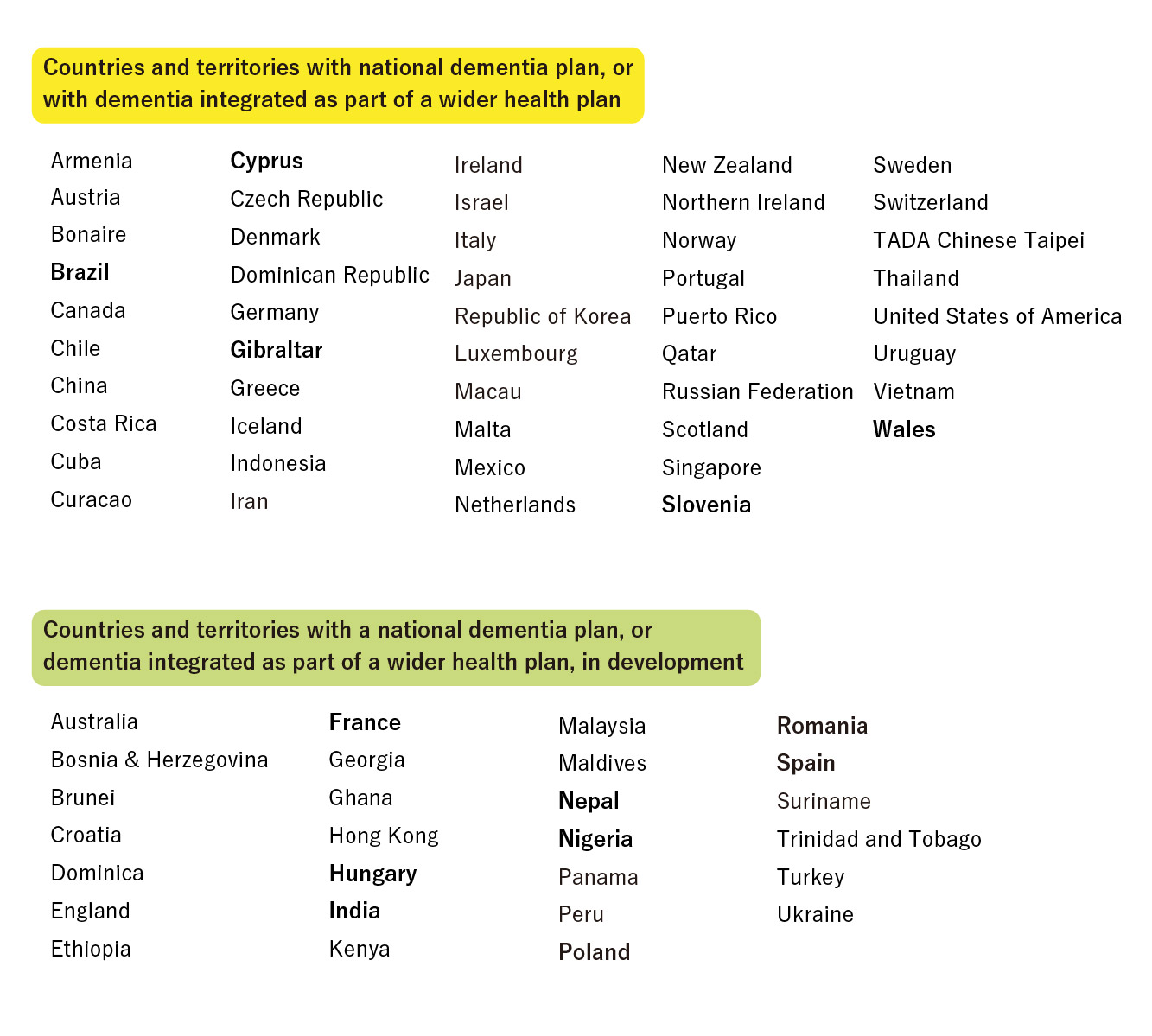
The WHO’s “Global action plan on the public health response to dementia 2017-2025” (hereinafter, the “WHO Action Plan”) was presented in 2017 and set targets for 2025, stating, “75% of countries will have developed or updated national policies, strategies, plans or frameworks for dementia, either stand-alone or integrated into other policies/plans, by 2025.” The current total of 39 Member States only represents one in five of the 194 Member States that endorsed the WHO Action Plan, so these efforts have fallen far short of that target.
While progress toward the goals of the WHO Action Plan has been at a standstill since 2023, people living with dementia and their families are still eager to see governments fulfill their commitments to that plan. In response, ADI is requesting that WHO Member States unanimously support a ten-year extension of the WHO Action Plan to 2035.
Fig. 2
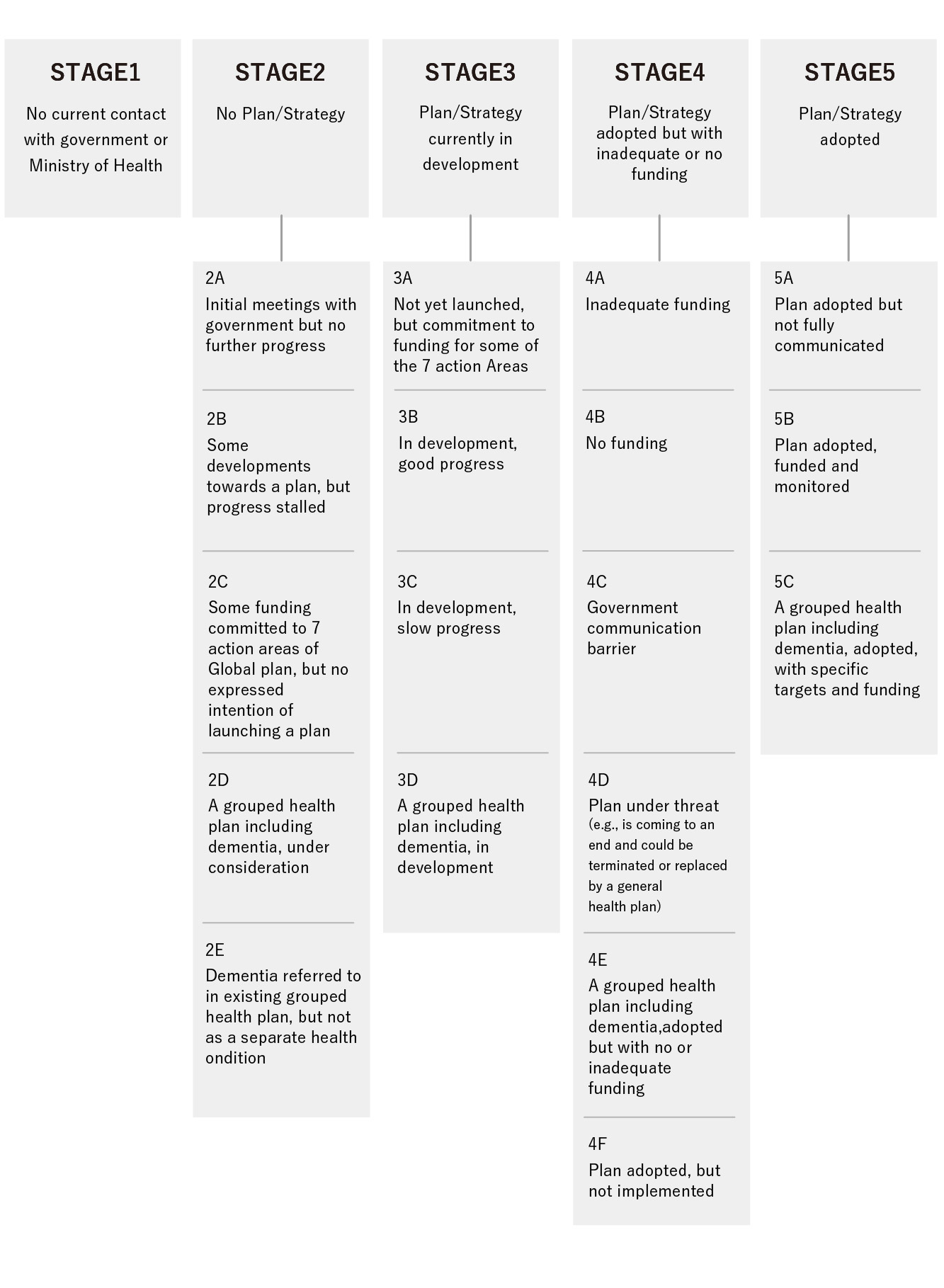
Like last year, Japan’s national strategy for dementia was determined to be “Stage 5B: Plan adopted, funded, and monitored.” The report also mentions that during its presidency of the G7 in 2023, Japan also hosted a dementia symposium alongside the Health Ministers’ Meeting in Nagasaki, which emphasized the importance of measures for dementia in its communiqué. As we approach the new deadline for the targets set by the WHO Action Plan, the need to step up global efforts on dementia becomes even greater.
Fig. 3
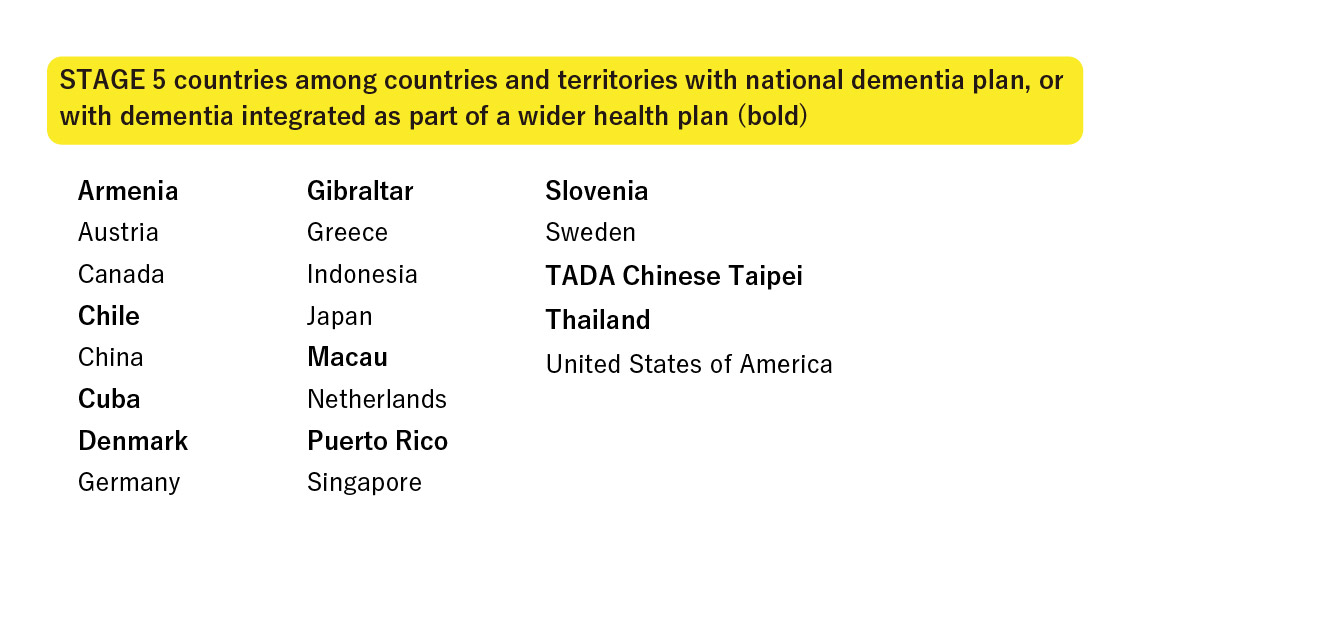
Figure 3 shows which of the countries and regions shown in the previous figure have already developed national dementia strategies that are considered Stage 5 using the staging criteria described above. Comparing these countries and regions to those listed in last year’s report, we see that Finland and South Korea are no longer included, while Armenia, Chile, Cuba, Denmark, Gibraltar, Macau, Puerto Rico, Slovenia, Taiwan, and Thailand are new additions. Looking back over the past two years, there are multiple countries and regions that receded from Stage 5 but have returned this year. There was great turbulence in international politics in 2023 due to factors such as the Russian invasion of Ukraine and problems in Palestine, but it also may be safe to conclude that healthcare systems in various countries have recovered after overcoming the COVID-19 pandemic.
ADI states that it hopes an extension of the WHO Action Plan deadline will help guide efforts toward the shared goal of finding a cure for dementia as well as strengthen healthcare systems to ensure access to new treatments and much-needed care to improve the lives of people living with dementia and their caregivers.
Conclusion
This column examined the content of the 2024 ADI Report.
The Basic Act on Dementia to Promote an Inclusive Society (hereinafter, the “Basic Act on Dementia”) came into effect on January 1, 2024. Starting with efforts to advance discussions with all stakeholders in industry, Government, academia, and civil society, Health and Global Policy Institute (HGPI) has implemented various policy approaches from the perspectives of civil society and those most affected by dementia.
The Basic Plan for the Promotion of Policies on Dementia, which is to be formulated in accordance with the Basic Act on Dementia, is expected to be approved by Cabinet Decision in fall 2024. In addition, the introduction of new disease-modifying drugs for dementia is likely to influence future developments in policy discourse. Examining dementia agendas in each country, we can see that Japan is not the only place where the launch of new drugs has led to increased emphasis on prevention in national plans as well as greater interest from society. In its capacity as a leading super-aging society, we believe it will become even more important for Japan to take the initiative in dementia policy.
The extension of the WHO Action Plan deadline will make global collaboration an urgent issue as well as make it necessary for Japan to popularize and promote the involvement of people with lived experience with dementia and citizens in research and development at the global level. The first step toward achieving this will be for citizens to recognize involvement as a social issue. In the future, HGPI will continue advancing efforts to create a dementia-inclusive society through policy recommendations and advocacy activities.
Column author
Akari Hase (Program Specialist, HGPI)
Top Research & Recommendations Posts
- [Policy Recommendations] The Path to a Sustainable Healthcare System: Three Key Objectives for Public Deliberation (January 22, 2026)
- [Research Report] Perceptions, Knowledge, Actions and Perspectives of Healthcare Organizations in Japan in Relation to Climate Change and Health: A Cross-Sectional Study (November 13, 2025)
- [Research Report] The 2025 Public Opinion Survey on Healthcare in Japan (March 17, 2025)
- [Policy Recommendations] Reshaping Japan’s Immunization Policy for Life Course Coverage and Vaccine Equity: Challenges and Prospects for an Era of Prevention and Health Promotion (April 25, 2025)
- [Research Report] The 2023 Public Opinion Survey on Satisfaction in Healthcare in Japan and Healthcare Applications of Generative AI (January 11, 2024)
- [Research Report] AMR Policy Update #4: Cancer Care and AMR (Part 1)
- [Policy Recommendations] Developing a National Health and Climate Strategy for Japan (June 26, 2024)
- [Public Comment Submission] “Assessment Report on Climate Change Impacts in Japan (Draft Overview)” (December 24, 2025)
- [Research Report] Survey of Japanese Physicians Regarding Climate Change and Health (December 3, 2023)
- [Research Report] The Public Opinion Survey on Child-Rearing in Modern Japan (Final Report) (March 4, 2022)
Featured Posts
-
2026-01-09
[Registration Open] (Hybrid Format) Dementia Project FY2025 Initiative Concluding Symposium “The Future of Dementia Policy Surrounding Families and Others Who Care for People with Dementia” (March 9, 2026)
![[Registration Open] (Hybrid Format) Dementia Project FY2025 Initiative Concluding Symposium “The Future of Dementia Policy Surrounding Families and Others Who Care for People with Dementia” (March 9, 2026)](https://hgpi.org/en/wp-content/uploads/sites/2/dementia-20260309-top.png)
-
2026-02-05
[Registration Open] (Webinar) The 141st HGPI Seminar “Current Status and Future Prospects of Korea’s Obesity Policy: Voices of People with Lived Experience in Policy Promotion” (March 3, 2026)
![[Registration Open] (Webinar) The 141st HGPI Seminar “Current Status and Future Prospects of Korea’s Obesity Policy: Voices of People with Lived Experience in Policy Promotion” (March 3, 2026)](https://hgpi.org/en/wp-content/uploads/sites/2/hs141-top-1.png)
-
2026-02-06
[Research Report] AMR Policy Update #5: Cancer Care and AMR (Part 2)
![[Research Report] AMR Policy Update #5: Cancer Care and AMR (Part 2)](https://hgpi.org/en/wp-content/uploads/sites/2/HGPI_20260204_AMR-Policy-Update-5.png)




